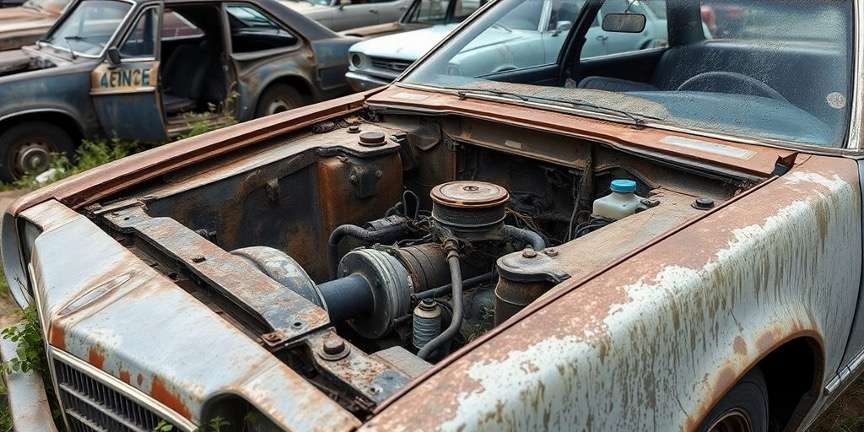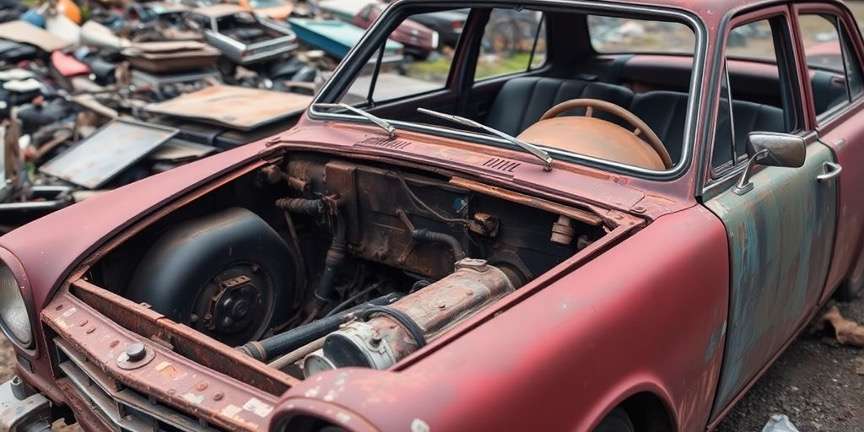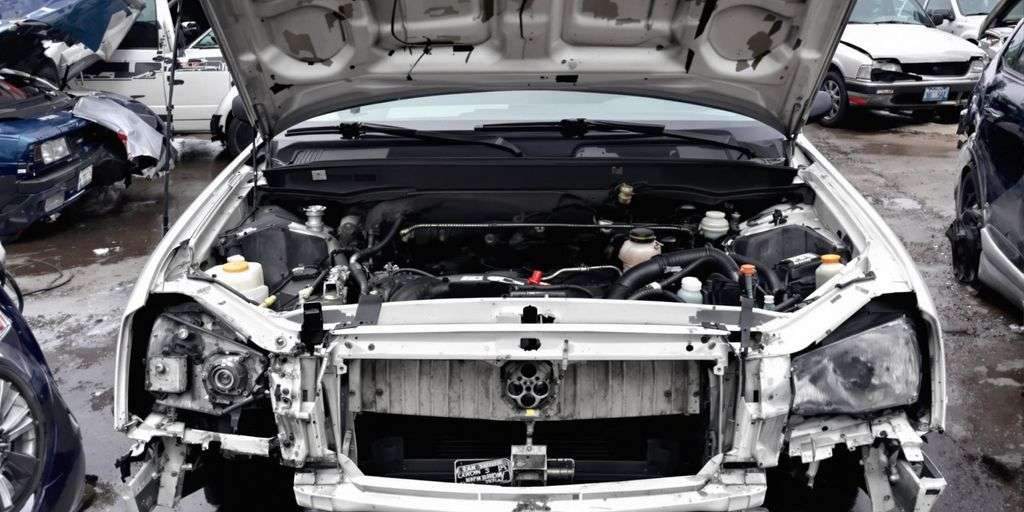Key Takeaways
- You can sell a junk car without an engine, but it might fetch a lower price.
- Understand the legal requirements in your state before selling a car without a title.
- Salvage yards often buy cars for their metal value, while private buyers may look for parts.
- Selling parts individually can sometimes earn you more money than selling the whole car.
- Proper documentation and presentation can make the selling process smoother and more profitable.
Understanding the Value of a Junk Car Without an Engine

Factors Affecting Junk Car Value
When you're trying to sell a junk car without an engine, several factors come into play that can affect its value. First, the weight of the car's metal is a big deal. Since salvage yards often focus on recyclable materials, the heavier the car, the more you might get. However, don't overlook the impact of distance. If you can drive the car to the yard yourself, you might get a better offer since they won't have to tow it.
Additionally, the car's make, model, and age can influence its value. Popular models or vintage cars might fetch a bit more, even without an engine. And remember, the condition of the remaining parts, like the body or interior, can also sway the price.
How Missing Parts Impact Pricing
A missing engine might seem like a dealbreaker, but it's not the end of the world. Salvage yards prioritize the metal for recycling, so a missing engine doesn't necessarily mean a huge price drop. However, if you have other missing parts, like the transmission or wheels, that could impact the offer more significantly.
If you're considering selling to private buyers, they might be more interested in the car's potential for parts. In this case, missing components could lower the price considerably, as buyers often look for cars they can fix up or strip for parts.
Assessing the Worth of Reusable Components
Even without an engine, your car might still have some valuable parts. Tires, the transmission (if it's still there), and interior components can be sold separately for a decent amount. To maximize your return, consider researching the market value of these parts or using a free junk car value calculator to get an idea of what they're worth.
If you have the time and skills, stripping the car of these components and selling them individually can be more profitable than selling the car whole. But keep in mind, this is a labor-intensive process and requires some know-how.
Selling a junk car without an engine isn't just about getting rid of it; it's about understanding what you have and making the most out of it. Whether you choose to sell it as is or strip it for parts, knowing your options can help you make the best decision.
Legal Considerations When Selling a Junk Car
Selling Without a Title: What You Need to Know
Selling a junk car without a title can be a bit tricky, but it's not impossible. Most states have specific regulations that allow you to sell a car without a title, provided you can prove ownership. This usually involves showing an old registration and a valid ID. However, you must ensure that there is no lien on the car. If there is, you'll need to pay it off first. Having a notarized bill of sale can also help legitimize the transaction.
State Regulations on Junk Car Sales
State laws vary widely when it comes to selling junk cars. Some states require specific documentation, while others may have lenient rules. It's crucial to check the local DMV or equivalent agency's guidelines before proceeding. Some states might even have incentives for recycling old vehicles, so it's worth doing some research.
Avoiding Legal Pitfalls in Car Sales
To steer clear of any legal troubles, make sure all your paperwork is in order. This includes a clear bill of sale, proof of ownership, and any other documents required by your state. Be honest about the condition of the car to avoid any disputes later on. Remember, transparency is key when dealing with potential buyers. A little diligence upfront can save a lot of hassle down the road.
Selling a junk car might seem like a straightforward task, but without the right paperwork and knowledge of the law, it can quickly become a legal headache. Always double-check your state's requirements and keep your documents organized to ensure a smooth sale.
Exploring Selling Options for Junk Cars
Selling to Salvage Yards: Pros and Cons
When you're thinking about offloading your junk car, salvage yards are usually the first stop. Salvage yards make the process quick and easy. They focus mainly on the scrap metal value rather than the car's condition or missing parts. This means you won't have to worry about cleaning it up or fixing anything.
- Pros:
- Cons:
Private Buyers vs. Junkyards
Selling to private buyers might get you a better price, especially if your junk car has parts that can be reused. But it takes more time and effort. You'll need to market your vehicle, maybe even fix it up a bit, and deal with potential buyers who might haggle or flake out.
- Private Buyers:
- Junkyards:
Online Platforms for Junk Car Sales
In today's digital age, online platforms have become a popular way to sell junk cars. Websites and apps dedicated to car sales can connect you with buyers who are specifically looking for junk vehicles.
- Advantages:
- Disadvantages:
Selling a junk car online might take a bit more effort initially, but it can lead to better offers and a broader range of buyers interested in specific parts or the entire vehicle.
Maximizing Profit from a Junk Car Sale
Stripping Parts for Individual Sale
If you're looking to get the most out of your junk car, consider selling parts individually. This approach can often yield more cash than selling the car as a whole. Start by identifying valuable components like the catalytic converter, battery, tires, and electronics. These parts can fetch a good price on the market. Make sure you have the right tools and some mechanical know-how, or enlist a friend who does. Keep in mind, though, this process is time-consuming and requires proper storage for the parts until they're sold.
Negotiating with Buyers
When it comes to selling a junk car, negotiation is key. Whether you're dealing with a private buyer or a salvage yard, know your car's worth beforehand. Research the going rates for scrap metal and any reusable parts you have. Be prepared to haggle and don't settle for the first offer unless it's fair. A little back-and-forth can sometimes lead to a better deal.
Timing Your Sale for Best Offers
Believe it or not, timing can influence how much you get for your junk car. Scrap metal prices fluctuate, so selling when prices are high can make a significant difference. Also, consider the season: demand for certain parts might increase in winter, like tires, or in summer, like air conditioning components. Keep an eye on market trends and choose the right moment to sell for maximum profit.
Timing, negotiation, and knowing the value of your car's parts are essential steps to ensure you get the best deal possible when selling your junk car.
Preparing Your Junk Car for Sale

Documenting Ownership and Condition
First things first, you need to gather all the necessary paperwork. Having proof of ownership is crucial, especially if you don't have the title. You can often use an old registration or a bill of sale. Make sure to write down the vehicle's condition, noting any missing parts or damage. This documentation not only helps in the selling process but also protects you from future disputes about the car's state.
Cleaning and Presenting Your Car
Even though it's a junk car, presentation still matters. Give it a good clean to make it look presentable. Remove any personal items and give the interior a quick vacuum. If the car is covered in dirt and grime, a simple wash can make a big difference. A cleaner car often fetches a better price, as it shows you cared for it, even in its final days.
Safety Tips for Handling Junk Cars
Handling a junk car can be risky if you're not careful. Always wear protective gloves and eyewear when working on or moving the car. Be cautious of sharp edges and rusty parts. If you're stripping parts, ensure the car is stable and won't roll or tip over. It's also wise to have a first aid kit nearby, just in case of minor injuries. Safety should always come first in these situations.
Preparing your junk car for sale might seem like a hassle, but a little effort can go a long way in ensuring a smooth transaction and a fair price.
Environmental and Economic Benefits of Recycling Junk Cars
Recycling Processes and Their Impact
Recycling junk cars is a win-win for both the environment and the economy. When a car is recycled, its parts are either reused or broken down into raw materials. This process cuts down on the need for new materials, conserving resources and reducing pollution. Metals like steel and aluminum are melted and reused, which saves energy compared to producing new metal. It’s a cycle that keeps on giving, as each recycled car reduces the demand for mining and manufacturing new materials.
Economic Advantages of Car Recycling
Recycling cars isn't just good for the planet; it’s also economically smart. It creates jobs in the recycling and manufacturing industries, boosting the local economy. Plus, selling your junk car can put some cash back in your pocket. By reducing the need for new parts, recycling helps keep costs down for manufacturers and consumers alike. In fact, recycling industrial scrap can lead to significant savings by lowering landfill waste and conserving natural resources.
Environmental Conservation Through Car Recycling
Every car that gets recycled means fewer harmful emissions and less energy use. When parts are reused, it means fewer new parts need to be made, which cuts down on the carbon footprint of manufacturing. Recycling also keeps toxic substances, like battery acid and motor oil, out of landfills, protecting soil and water. By choosing to recycle, you’re playing a part in preserving the environment for future generations.
Recycling junk cars is a simple yet powerful way to contribute to both economic growth and environmental health. It’s about making the most out of what we already have and ensuring a sustainable future.
Common Mistakes to Avoid When Selling a Junk Car
Overlooking Legal Requirements
When selling a junk car, ignoring legal requirements can lead to big headaches. Not having a title is a common issue. Many think they can sell without it, but that's often illegal. Always check your state's rules. Some places might allow it with extra paperwork, but it's risky. Also, don't forget to remove your personal stuff from the car. You'd be surprised how many people leave things behind. It's not just about losing your items—it's also about privacy concerns.
Underestimating Car Value
People often sell their junk cars for less than they're worth. They see a rusty shell and think it's worthless. But even without an engine, parts like the tires, battery, or radio can still bring in some cash. Before selling, take a moment to assess what's still good. You might find more value in selling parts separately. Salvage yards often focus on scrap metal weight, but private buyers might pay more for specific parts.
Ignoring Market Trends
Market trends can affect how much you get for your junk car. Scrap metal prices go up and down, and so does demand for certain parts. Keep an eye on these trends to sell at the right time. A little research can go a long way. For instance, if metal prices are high, you might get a better deal from a junkyard. But if there's a demand for parts, selling individually could be smarter.
Selling a junk car isn't just about getting rid of an old vehicle. It's about making smart choices to get the best deal and avoid unnecessary trouble. Take the time to understand the process and avoid common pitfalls.
Conclusion
Selling a junk car with a missing engine might seem like a hassle, but it's definitely doable. Whether you decide to sell it to a junkyard, a salvage yard, or even part it out yourself, there are options out there. Just remember, the key is to do a bit of homework first. Check the rules in your state, gather any necessary paperwork, and maybe even get a few quotes to see what your car is worth. It might take a little effort, but turning that old clunker into cash is totally possible. So, don't let that missing engine hold you back—get out there and explore your options!
Frequently Asked Questions
Can I sell my junk car if it doesn't have an engine?
Yes, you can sell a junk car even if it's missing an engine. Many buyers, like salvage yards, are interested in the metal and other parts that can be recycled.
Do I need a title to sell my junk car?
It depends on where you live. Some places let you sell a car without a title if you can prove you own it with other papers, like an old registration and your ID.
What's the best way to sell a junk car?
You have a few choices. You can sell it to a salvage yard, find a private buyer, or use online platforms that specialize in junk car sales.
How can I get the most money for my junk car?
To get more money, think about selling valuable parts separately before selling the rest of the car. Also, compare offers from different buyers to find the best deal.
Is it safe to sell my junk car online?
Yes, selling online can be safe if you use trusted websites and follow safety tips, like meeting buyers in public places and not sharing personal information.
What happens to my junk car after I sell it?
After selling, your junk car is usually taken apart. Useful parts might be sold, and metals and other materials are often recycled to help the environment.



